Saturday, September 30, 2023. Annette’s News Roundup.
I think the Roundup makes people feel not so alone.
To read an article excerpted in this Roundup, click on its blue title. Each “blue” article is hyperlinked so you can read the whole article.
Please feel free to share.
Invite at least one other person to subscribe today! https://buttondown.email/AnnettesNewsRoundup
________________________________
Senator Diane Feinstein, age 90, died.
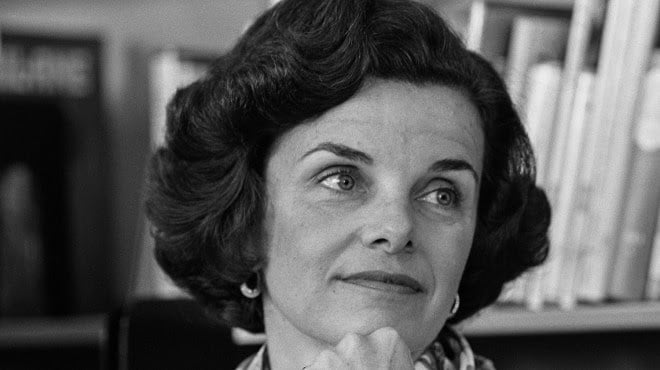
Dianne Feinstein in San Francisco, California, September 1979.
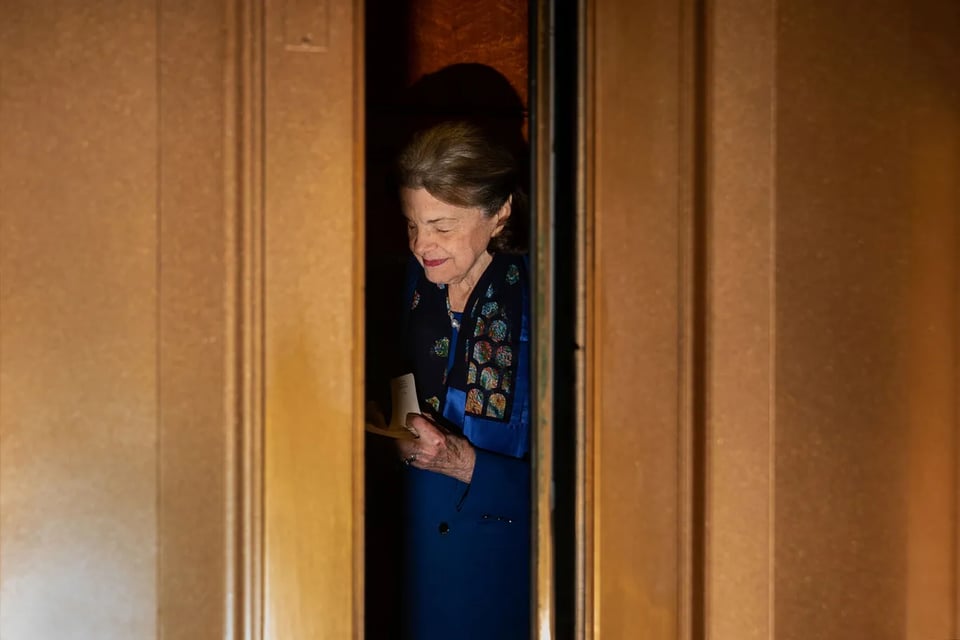
From Stanford Magazine, 2017 -
[Feinstein’s] steely determination has been forged over the course of six decades in public life, through trials both political and personal: divorce and single motherhood in her 20s; the death of her second husband, Bertram Feinstein, to cancer in 1978; taking over as mayor of San Francisco after the assassinations of Mayor George Moscone and Supervisor Harvey Milk by their former colleague Dan White; running the city during the height of the AIDS crisis; defying leaders of the U.S. intelligence community and the Obama White House to expose the truth about the CIA’s torture of terrorism suspects.
—
Feinstein had a tumultuous childhood. Her mother, Betty, a beautiful Russian immigrant and a former model, was prone to violent, alcohol-fueled rages, frequently directed at Feinstein and her two younger sisters, Lynn and Yvonne. “The smallest thing could set her off,” Feinstein later recalled. “You could not reason with her.” The burden of managing Betty’s eruptions fell to Dianne and her father, Leon Goldman, a gifted physician who was the first Jewish chair of surgery at the medical school at UCSF. Feinstein attended the Convent of the Sacred Heart, an exclusive and highly regimented Catholic school for girls, where she learned discipline and developed an interest in acting.
In her senior year of high school, she was accepted to UC-Berkeley and Stanford. Her father made his preference clear. “My dad had been Cal all his life. He went to Cal, he was a big sports fan — he went to every single Cal football game. I mean, he loved it.” Feinstein told her father she thought she would get a better education at a smaller school. “He said, ‘Remember, Dianne, it’s better to sit one thousand feet away from a genius than one hundred feet from a mediocrity.’ ” She bellows with laughter. “That was his argument for Cal. So I chose Stanford.”
Feinstein describes her arrival on the Farm in the fall of 1951 as “a wonderful release” because “I was on my own, could make my own decisions and didn’t have to ask for approval.” She lived in Roble and threw herself into social activities — at the expense of academics, like legions of Stanford freshmen before and since. “I had the potential to be a very good student. I was not a very good student.” A poor grade in freshman general biology dissuaded her from following her father into medicine. Instead, she gravitated toward courses in American history and politics. She recalls a seminal course in American political thought taught by a visiting professor. “The final was all essay, so I could write my heart out, and I got an A+. I decided that if these thoughts are rewarded, maybe I ought to try to pursue a field where I obviously have some talent.”
From her first months at Stanford, Feinstein sought ways to make her mark. She put herself forward for a position as a freshman representative on the Associated Students’ executive committee and ran for secretary of the Associated Women Students. As a junior, she lived as a sponsor in Branner, advising incoming female students on how to make their way on a campus where men outnumbered women 3 to 1. “It’s sort of interesting to me now that I really liked doing it — but I really did. We’d all get together in one room and kind of talk, and I’d try to give them advice. Here I am: a big junior! What did I know?” And she had a “great romantic relationship” with Leon King, the center on Stanford’s 1952 Rose Bowl team. “We went down there and lost — 44 to nothing!” she recalls, bursting into laughter. (It was actually 40–7.)
By the start of her senior year, Feinstein had become politically active. She’d been overseas for the first time, traveling to the territories of then-Yugoslavia on a student trip led by Stanford historian Wayne Vucinich.
With a half-dozen other students, she established Stanford’s first chapter of Young Democrats, a sign of her political awakening and growing independence from her staunch Republican father.
“He used to say, ‘Dianne and five Democrats are holed up in some place having a meeting,’ ” Feinstein says. “We did have a little organization — there weren’t many of us, and we couldn’t meet on campus, which was kind of a disincentive to any kind of political organization. But that’s when I chose to be a Democrat, based on my readings in history and that class in American political thought. And that’s really how Stanford had an influence on me.”
The biggest decision of her undergraduate years was running for student body vice president, the highest office women could hold, in the spring of 1954.
One of three candidates, she sought votes everywhere she could — including fraternity row, which wasn’t exactly receptive to Feinstein’s stump speeches. “I was probably the first woman ever to campaign that way.” The all-male audiences threw food at her and hauled her into a shower to dunk her. (In our interview, Feinstein singled out the Zetes, though the Phi Delts have suffered more ignominy in previous accounts.)
Prior to the election, she conducted her own poll of students on the Quad and concluded, “I might not get elected.” In the end, after a record turnout, she won 63 percent of the vote. “I can’t say that the office I held was profound in any way, shape or form, but campaigning for it was,” she says now. “I went through my own vicissitudes during that race, but that was OK and I survived it, which sort of amazes me to this day.”
Assuming the role of student body vice president gave Feinstein greater visibility and opportunities to broaden her horizons. She hosted Soviet journalists visiting campus on an exchange program and was a frequent speaker at events held by the Stanford Political Union, a group that convened policy discussions with prominent public officials. During one forum on California’s regulation of alcohol sales, she delivered the student rebuttal to remarks made by a conservative state legislator named Caspar Weinberger, who would later become the U.S. secretary of defense.
Feinstein recalls the early 1950s as a “great time of life — there wasn’t a lot of toil and trouble. We were kind of a different country.” The tumult that accompanied Vietnam and the civil rights struggles of the 1960s lay ahead, but the Korean War and McCarthyism still intruded on campus life. Feinstein’s student government tenure reflected her engagement in the country’s political currents and determination to raise student awareness of them. She had spirited arguments with ASSU president Peter Bing, ’55, with whom she shared an office. “He was very conservative, and I was not so conservative,” Feinstein says. “We were an interesting duo.” Bing, who later served as president of Stanford’s Board of Trustees, says in an email that “Dianne always hoped the ASSU would take on issues beyond those related to Stanford. We didn’t. But her readiness to deal with important, complex problems was already clearly evident. And her approach, often impassioned, was through civil dialogue, one of her lasting hallmarks.”
A few months before graduating in 1955, Feinstein applied for a fellowship with the Coro Foundation, a public policy internship program for recent college graduates. In her application, she wrote, “My future plans center around public affairs in that I plan to run for political office on a local and possibly national level.”
Looking back, Feinstein believes her Stanford experiences shaped her public character in ways even the ambitious 21-year-old Dianne Goldman could never have imagined. They gave her a “fortitude and internal compass” that helped her navigate unexpected twists in the journey to come. “It was kind of pivotal,” she says of her ASSU campaign, “because as pathetic as it was, it was my first race. And as such it did begin some degree of conditioning. Stanford was a real part of my maturation and development of a course of life for me.”
Feinstein’s two defining battles in the Senate underscore her tenacity.
In 1993, just one year after her election, she sponsored a bill to outlaw the manufacture and sale of high-powered semiautomatic guns known as assault weapons. Despite fierce opposition from the gun lobby, Feinstein lined up enough votes to get it passed — though she says now it was a “mistake” to agree to let the bill expire after 10 years.
Despite several unsuccessful attempts to reinstate the ban, she continues to fight for “prudent controls on weapons. You don’t need battlefield weapons for the defense of your home or anywhere else in civilized society.”
More recently, as chair of the Senate Intelligence Committee, she waged a six-year fight with the CIA over the drafting and release of a 6,700-page investigation into the agency’s use of “enhanced interrogation techniques” after September 11, 2001.
In March of 2014, after learning that the CIA had hacked the computer network of the committee’s investigators, Feinstein took to the Senate floor to denounce the CIA for trying to intimidate her staff and for violating the Constitution’s separation of powers. Ultimately, the Obama administration agreed to the release of a 525-page portion of the Senate committee’s report; after months of denials by then-CIA director John Brennan, the agency acknowledged that it had improperly accessed the computers and emails of Senate staffers.
“It was one of those breathtaking historical moments, to hear a United States senator accuse the CIA of spying [on her staff],” says Sen. Cory Booker, ’91, MA ’92, (D-N.J.). “And then for it to come out and be true, and for the director of the CIA to have to apologize — it shows the iron will of this person and how hard she will fight for what she believes is right. It was really the embodiment of who she is.”
When Booker joined the Senate in 2013, Feinstein summoned him to her office. “She wanted to talk about establishing the discipline and system of support needed to become a great senator. It was all about systems and operations — she went through the internal mechanisms of having a highly effective office, as you’d expect from a great manager or mayor. It was one of the more memorable meetings I had, because of how profoundly practical and helpful it was.”
Booker and Feinstein, both former urban mayors, consult frequently on criminal justice issues. “I love the way her mind works,” Booker says. “She doesn’t care what polls say. I literally see her grappling with the issues, asking difficult questions. It’s not staffers telling her things; she’s the one getting to the bottom of it.”

An Overview. The 19th Weekly.
In 1993, Sen. Dianne Feinstein’s first full year in the Senate, she was one of seven women there. Today there are 24. Just 59 women have served in the U.S. Senate in total, making up under 5 percent of all of those who have walked the chamber’s halls.
Feinstein, who died Thursday night at the age of 90, led a historic political career shaped by tragedy and defined by the barriers she broke.
Feinstein came to power in San Francisco in the 1960s and 1970s at a time when few women held elected office and participated visibly in politics. She was the first woman to lead the San Francisco Board of Supervisors in the late 1970s and became the city’s first woman mayor in 1978 after the dual assassinations of Mayor George Moscone and Supervisor Harvey Milk.
Feinstein was elected to the Senate in 1992, known as “The Year of The Woman.” Her path up through San Francisco politics paved the way for the woman leaders to follow, including former House Speaker Nancy Pelosi and Vice President Kamala Harris. She spent much of her more than 50 years in public service inspiring other women.
Her historic achievements didn’t stop once she was elected. Feinstein was the first woman to hold the gavel on three U.S. Senate committees. In office, she was a lifelong ally of the LGBTQ+ community, a fighter for gun safety laws and a dogged investigator unafraid to hold the CIA accountable for its post-9/11 torture programs.
On Friday morning, as a bouquet of white flowers sat on her empty desk, her colleagues spoke on the Senate floor to memorialize her work ethic, her integrity and her kindness toward her colleagues.
“She saw that she could be there when she was needed, and she was there,” said Sen. Patty Murray of Washington, who was also elected in The Year of the Woman and served with Feinstein for 30 years. “I’m so sorry I didn’t hug her when she went back out that door yesterday.”
Grace Panetta
Politics reporter
One more thing.

Dianne Feinstein. 2019.
Feinstein’s determination not to leave her Senatorial seat was treated by the media as a willful act of an old useless woman who had outlived her worth. They seem not to know that minority Republican leader McConnell said if Feinstein resigned, he would not allow her replacement to be on the Senate Judiciary Committee. That would have meant President Biden’s nominees would not have been advanced toward confirmation. Always a political giant, Feinstein stayed on to fight for what was right.
________________________________
The GOP’s Government Shut-Down.
Did you know that Congress passed a special law to get paid during government shutdowns when the rest of the government — deployed soldiers, border guard, law enforcement, food banks, etc., — don’t? @HouseGOP alone can stop it! The hypocrisy/selfishness is staggering. pic.twitter.com/eu1McXt4i4
— Y. Vindman (@YVindman) September 29, 2023
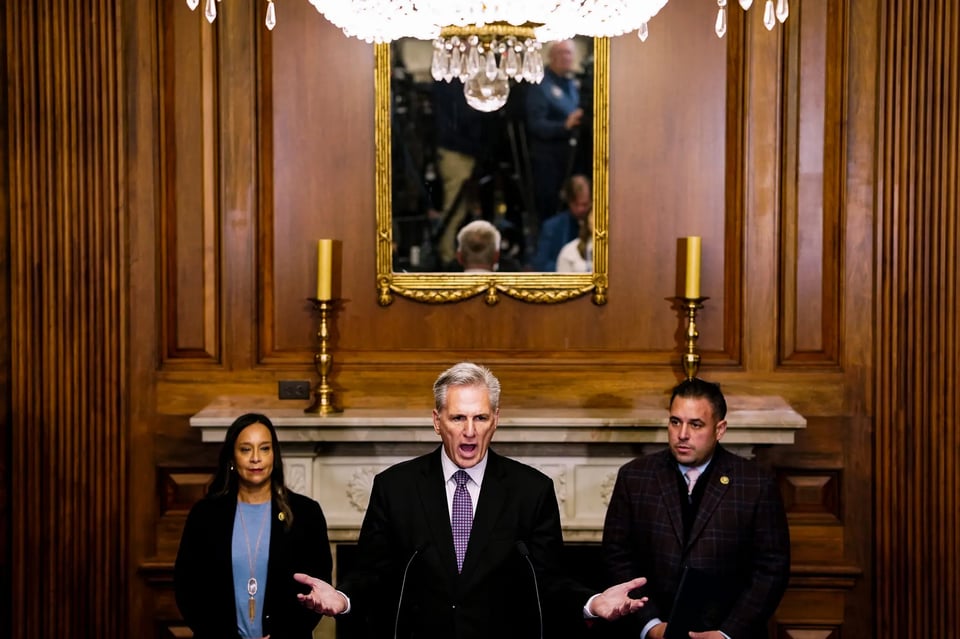
Speaker Kevin McCarthy holding a news conference on Capitol Hill on Friday before his party defeated his measure to temporarily extend government funding.

Where would a government shutdown immediately be felt most?

FEMA has said it would be unable to continue its operations in all of the 82 major disaster sites it is currently servicing, including rebuilding from wildfires in Hawaii.
Washington braced for a government shutdown over the weekend as Congress remained mired in dysfunction on Friday. Federal agencies planned to send home hundreds of thousand workers, who would not be paid until the shutdown ended. Hundreds of thousands of others deemed essential, like air traffic controllers, would be ordered to work. They, too, would not be paid until Congress reached a deal.
The nation’s capital always feels the effects of shutdowns most acutely, but Americans beyond Washington also face consequences. Here is where they would notice them most immediately.
Food and Medical Help
The Special Supplemental Nutrition Program for Women, Infants and Children would run out of funding within days, jeopardizing food and medical assistance for nearly seven million mothers and children. About 10,000 children would also immediately lose access to Head Start programs.
Some of the most essential benefits, including Social Security, Medicare and Medicaid and a variety of benefits for veterans, would be unaffected. The Supplemental Nutrition Assistance Program, or SNAP, is also expected to continue through October, according to the Agriculture Department.
Business and tax support
Private businesses that depend on the federal government even in tangential ways would have to adjust.
The Small Business Administration would be forced to halt processing new loan applications. Many farmers would be similarly unable to secure loans from the Department of Agriculture around harvest season.
Routine inspections of a variety of workplaces could be limited or paused. The Occupational Safety and Health Administration would have to minimize work site safety inspections. And in the most recent shutdown, the Food and Drug Administration had to curtail food inspectionsat processing plants that produce fruits, vegetables, seafood.
Businesses and individual taxpayers would also run into problems.
The I.R.S. will see two-thirds of its work force furloughed, which means delayed refunds, closed call centers and no access to the National Taxpayer Advocate, an internal watchdog that helps troubleshoot problems. The revenue service normally receives 46,000 telephone calls per day in October.
National parks and forests
Many national parks and recreational areas would close their gates, hurting the surrounding communities that depend heavily on income from tourism.
Some states including Arizona and Utah have said they plan to draw on state funds to keep flagship national parks open, but a majority will close as many park rangers and forestry workers are furloughed.
Museums
The Smithsonian’s network of 21 museums and the National Zoo will use funds rolled over from the previous year and remain open until at least Oct. 7, when it has said it will re-evaluate its financial picture.
Federal courts
Federal courts have enough funds on hand to stay open for around two weeks, allowing most federal criminal cases to continue.
The Justice Department has said it will scale down its prosecution of civil cases to a bare minimum until funding is restored. Around 85 percent of Justice Department employees will continue to work, including the special counsel’s office, which will continue its prosecution of former President Donald J. Trump.
Environmental standards and disaster relief
With much of the Environmental Protection Agency’s staff set to be furloughed, the majority of the agency’s inspections at hazardous waste sites, drinking water and chemical facilities would be halted.
FEMA has also said it would be unable to continue its operations in all of the 82 major disaster sites it is currently servicing, including rebuilding from wildfires in Hawaii and hurricane recovery projects in Florida. If the shutdown persists for weeks or more, the White House has warned that FEMA’s Disaster Relief Fund could be depleted, setting up an emergency if more disasters were to occur this year.
The permitting and environmental review process for many recently launched infrastructure projects could also be disrupted because of furloughs at the E.P.A. and Department of the Interior.
Student aid and loans
Even as much of the government is shuttered, federal student loan payments will still come due starting in October. Interest on the majority of federal student loans began to accrue again this month.
Customer service at loan-servicing companies would not halt immediately but could be tapered down should the shutdown stretch past next week.
On Monday, Karine Jean-Pierre, the White House press secretary, said that processing for Federal Student Aid and Pell Grants should continue mostly unaffected for “a couple of weeks.”
Travel
Air traffic controllers and Transportation Security Administration officials will continue to work without pay and attempt to minimize flight disruptions. But trainings for new air traffic control staff workers would be paused as many airports are already experiencing shortages.
During the last shutdown, conditions for workers were so bad that T.S.A. employees considered walking off the job, which helped to hasten an agreement in Congress to end the shutdown.
Passport processing, which already takes around 10 to 13 weeks, will continue but could be limited by government building closures in some locations that house passport processing offices.
Amtrak is expected to continue regular service. (New York Times).
________________________________
Joe is always busy.
Historian Heather Cox Richardson‘s Report on the President’s historic speech, Thursday in Arizona, against Trump and for Democracy.
In Tempe, Arizona, today, President Joe Biden spoke at the dedication ceremony for a new library, named for the late Arizona senator John McCain, who died in 2018. Biden used the opportunity not only to honor his friend, but to emphasize the themes of democracy and to call out those who are threatening to overturn it. While Biden has made the defense of American democracy central to his presidency, he has never been clearer or more impassioned than he was today.
Biden recalled that when McCain was dying, he wrote a farewell letter to the nation that he had served in both war and peace. “We are citizens of the world’s greatest republic, a nation of ideals, not blood and soil,” McCain wrote. “Americans never quit…. We never hide from history. We make history.”
Biden reiterated the point he makes often: that the United States is the only nation founded on an idea, articulated in the Declaration of Independence, that we are all created equal and have the right to be treated equally before the law. While “[w]e’ve never fully lived up to that idea,” he said, “we’ve never walked away from it.” Now, though, our faith in that principle is in doubt.
“[H]istory has brought us to a new time of testing,” Biden said. “[A]ll of us are being asked right now: What will we do to maintain our democracy? Will we, as John wrote, never quit? Will we not hide from history, but make history? Will we put partisanship aside and put country first? I say we must and we will. We will. But it’s not easy.”
Biden laid out exactly what democracy means: “Democracy means rule of the people, not rule of monarchs, not rule of the monied, not rule of the mighty. Regardless of party, that means respecting free and fair elections; accepting the outcome, win or lose. It means you can’t love your country only when you win.”
“Democracy means rejecting and repudiating political violence,” he said. “Regardless of party, such violence is never, never, never acceptable in America. It’s undemocratic, and it must never be normalized to advance political power.”
“Today,” he warned, “democracy is…at risk.” Our political institutions, our Constitution, and “the very character of our nation” are threatened. “Democracy is maintained by adhering to the Constitution and the march to perfecting our union…by protecting and expanding rights with each successive generation.” “For centuries, the American Constitution has been a model for the world,” but in the past few years, he noted, the institutions of our democracy—the judiciary, the legislature, the executive” have been damaged in the eyes of the American people, and even the eyes of the world, by attacks from within.
“I’m here to tell you,” Biden said: “We lose these institutions of our government at our own peril…. Democracy is not a partisan issue. It’s an American issue.”
“[T]here is something dangerous happening in America now,” Biden said. “There is an extremist movement that does not share the basic beliefs in our democracy: the MAGA Movement.” After high praise for his Republican friend McCain, and recollections of working with Republicans to pass bipartisan legislation throughout his career, Biden made it clear that he does not believe “every Republican,” or even “a majority of Republicans” adheres to the MAGA extremist ideology. But, he said”
“[T]here is no question that today’s Republican Party is driven and intimidated by MAGA Republican extremists. Their extreme agenda, if carried out, would fundamentally alter the institutions of American democracy as we know it.”
The MAGA Republicans, Biden said, are openly “attacking the free press as the enemy of the people, attacking the rule of law as an impediment, fomenting voter suppression and election subversion.” They are “banning books and burying history.” “Extremists in Congress [are] more determined to shut down the government, to burn the place down than to let the people’s business be done.” They are attacking the military—the strongest military in the history of the world—as being “weak and ‘woke’.”
They are “pushing a notion the defeated former President expressed when he was in office and believes applies only to him: This president is above the law, with no limits on power. Trump says the Constitution gave him…’the right to do whatever he wants as President.’ I’ve never even heard a president say that in jest. Not guided by the Constitution or by common service and decency toward our fellow Americans but by vengeance and vindictiveness.”
Biden accurately recounted the plans Trump has announced for a second term: expand presidential power, put federal agencies under the president’s thumb, get rid of the nonpartisan civil service and fill positions with loyalists. Biden quoted MAGA Republicans: “I am your retribution,” “slitting throats” of civil servants, “We must destroy the FBI,” calling the Chairman of the Joint Chiefs of Staff a “traitor” and suggesting he should be executed. These extremists, he said, are “the controlling element of the House Republican Party.”
“This is the United States of America,” Biden said. “Did you ever think you’d hear leaders of political parties in the United States of America speak like that? Seizing power, concentrating power, attempting to abuse power, purging and packing key institutions, spewing conspiracy theories, spreading lies for profit and power to divide America in every way, inciting violence against those who risk their lives to keep America safe, weaponizing against the very soul of who we are as Americans.”
“The MAGA extremists across the country have made it clear where they stand,” Biden said. “So, the challenge for the rest of America—for the majority of Americans—is to make clear where we stand. Do we still believe in the Constitution? Do we believe in…basic decency and respect? The whole country should honestly ask itself…what it wants and understand the threats to our democracy.”
Biden knew his own answers:
“I believe very strongly that the defining feature of our democracy is our Constitution.
“I believe in the separation of powers and checks and balances, that debate and disagreement do not lead to disunion.
“I believe in free and fair elections and the peaceful transfer of power.
“I believe there is no place in America…for political violence. We have to denounce hate, not embolden it.
“Across the aisle, across the country, I see fellow Americans, not mortal enemies. We’re a great nation because we’re a good people who believe in honor, decency, and respect.”
Pointing to the fact that the majority of the money appropriated for the Bipartisan Infrastructure Law has gone to Republican-dominated states, he added: “I believe every president should be a president for all Americans” and should “use the Office of the President to unite the nation.”
The job of a president, he said, is to “deliver light, not heat; to make sure democracy delivers for everyone; to know we’re a nation of unlimited possibilities, of wisdom and decency—a nation focused on the future.”
“We’ve faced some tough times in recent years, and I am proud of the progress we made as a country,” Biden said, “But the real credit doesn’t go to me and my administration…. The real heroes of the story are you, the American people.” Now, he said, “I’m asking you that regardless whether you’re a Democrat, Republican, or independent, put the preservation of our democracy before everything else. Put our country first…. We can’t take democracy for granted.”
“Democracies don’t have to die at the end of a rifle,” Biden said. “They can die when people are silent, when they fail to stand up or condemn the threats to democracy, when people are willing to give away that which is most precious to them because they feel frustrated, disillusioned, tired, alienated.”
“I get it,” Biden said. But “[f]or all its faults…, American democracy remains the best…[path] forward to prosperity, possibilities, progress, fair play, equality.” He urged people not to sit on the sidelines, but “to build coalitions and community, to remind ourselves there is a clear majority of us who believe in our democracy and are ready to protect it.”
“So,” he said, “let’s never quit. Let’s never hide from history. Let’s make history.” If we do that, he said, “[w]e’ll have proved, through all its imperfections, America is still a place of possibilities, a beacon for the world, a promise realized—where the power forever resides with ‘We the People.’”
“That’s our soul. That’s who we truly are. That’s who we must always be.” (Letters of an American, September 28, 2023).
________________________________
Kamala is always busy.
Touch 👇 to watch 2 things -1) a scan of the crowd size, as students at Florida International University welcome the Vice President 2) the number of members of the crowd raising their hands to answer a question she asks.
Oh my goodness. VP Kamala Harris just asked a stadium of 5,000 students at Florida International University to raise their hands if they’ve ever participated in a school shooter drill. Every hand raised. This is why Republicans will lose. pic.twitter.com/IaMF2raR7z
— Victor Shi (@Victorshi2020) September 28, 2023
________________________________
“Immigrants - we get the job done.”
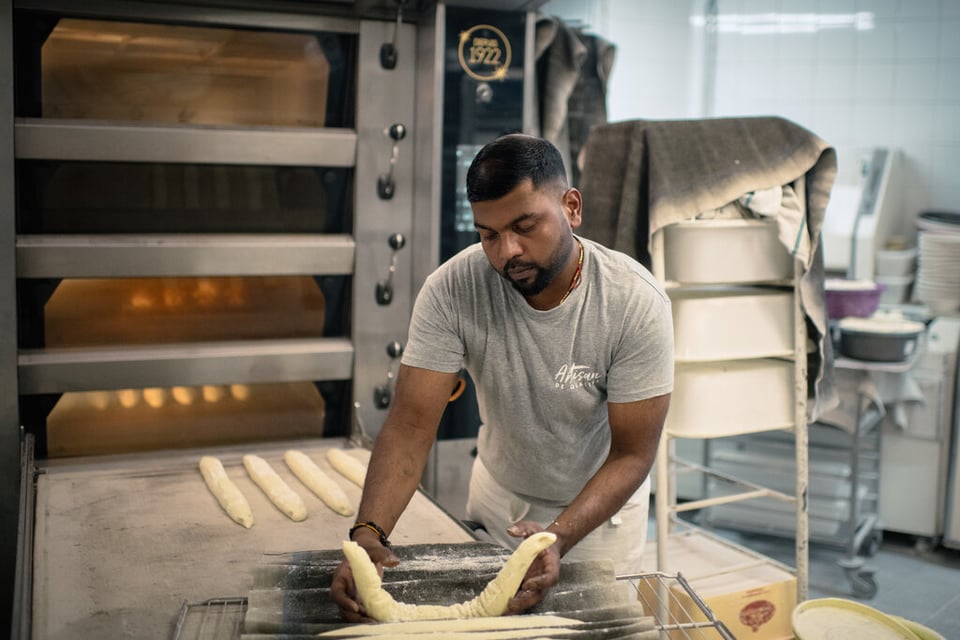
Tharshan Selvarajah, this year’s winner of the “Grand Prize of the Traditional French Baguette,” at his bakery in Paris, in September.
Tharshan Selvarajah, this year’s winner of the “Grand Prize of the Traditional French Baguette,” at his bakery in Paris, in September.
Most mornings, around 6:30, Tharshan Selvarajah arrives at the Élysée Palace, seat of the French presidency, and unloads around 30 baguettes into the security scanner.
The bread that is synonymous with France is sacred, but not to the point that it can pass unverified into President Emmanuel Macron’s mouth.
Nor is the baguette, in its highest expression, the exclusive domain of French bakers. Mr. Selvarajah is a Sri Lankan immigrant who has lived in France for 17 years but not yet applied for French citizenship, even as his bread has reached the summit of Gallic gustatory acclaim.
This year France marked the 30th anniversary of the “Grand Prize of the Traditional French Baguette,” organized by the Paris City Hall. Mr. Selvarajah, 37, an intense bearded man with a fierce work ethic, won, with his creation edging out 126 other baguettes.
His prize? The honor, for the next year, of delivering those baguettes to Mr. Macron and his staff. He also received some $4,250. The baker’s notoriety is now such that long lines form outside his boulangerie, Au Levain des Pyrénées, on the fringes of eastern Paris.
One Saturday morning, Mr. Selvarajah explained what made his bread special. Seated in a nearby cafe, he held up his hands.
“God gave us all different hands,” he said.
A smile broke across his face. “My mother’s chicken curry and my wife’s chicken curry may use the same chicken but they do not taste the same,” he said. “God gave me the hands to make the best baguette in France! I am never angry with the flour as I knead the dough.”
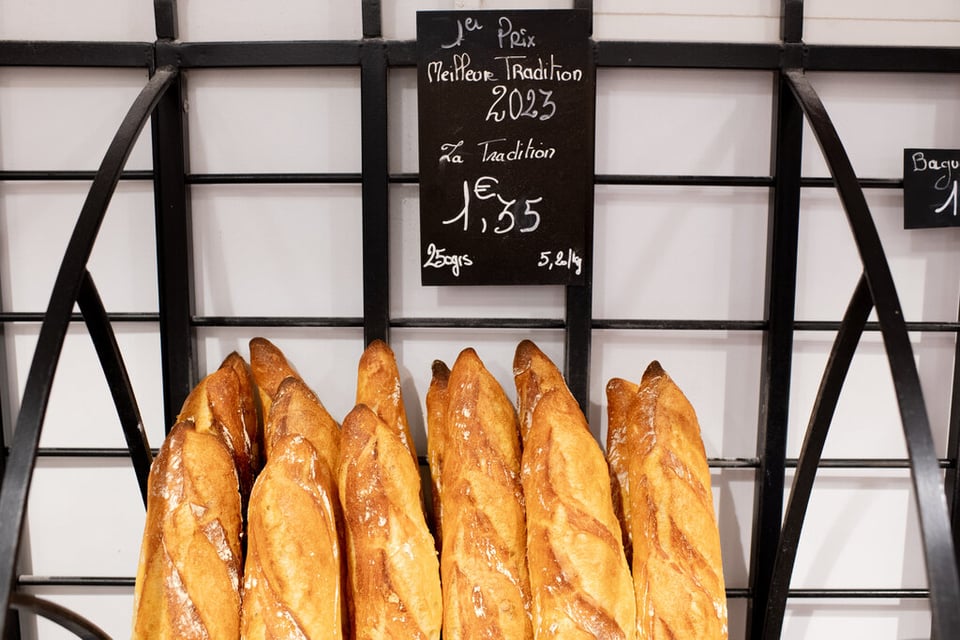
Freshly made baguettes for sale at Mr. Selvarajah’s boulangerie, Au Levain des Pyrénées, on the fringes of eastern Paris.
A “baguette de tradition,” or traditional baguette, is made from flour, water, salt and yeast. Period. Sounds simple, and on one level it is. Yet so much depends on the perfect baguette and the perfect baguette is elusive.
A crunchy deep golden crust must encase a fluffy, slightly salty interior, punctuated with the small air sacs, known as alveoli, that produce a mildly chewy consistency. Appearance, taste, texture and smell must find a delicate harmony.
This requires hard work. Mr. Selvarajah was a little irritated because his store assistants had not appeared. Always, he said, there’s some excuse. He works six days a week, up to 10 hours a day, and thinks such industry — typical of immigrants trying to get a toehold in a new land — may explain why several winners of the baguette prize over the past decade have been of Tunisian or Senegalese descent.
The competition itself is anonymous. “Baguettes are numbered after being deposited by candidates, then touched, smelled and tasted by a jury of experts,” Olivia Polski, the senior City Hall official who oversees the contest, said in an emailed response to questions. The best baguette, she suggested, should be “well-baked, light and airy. It should crackle in the mouth.”
Immigration is an explosive political issue in France — Mr. Selvarajah said he had encountered occasional racism and prejudice — and the many success stories among the failures tend to be obscured by the polemics. Immigrants often do jobs the French have begun to shun.
Baking is “a tough profession,” said Charlotte Quemy, as she ate a croissant she described as “top” outside Mr. Selvarajah’s bakery. She lives across town but likes to stop off on her way home from her job in the tech sector. “The French view is: To hell with getting up at 3 in the morning!”
Mr. Selvarajah arrived in France from Sri Lanka in 2006, and began work in an Italian restaurant making salads and desserts. Through a regular client at the restaurant, Xavier Maulavé, the owner of several bakeries, he was offered a job making bread. “I knew nothing about baguettes,” Mr. Selvarajah said.
Slowly, Mr. Selvarajah learned the art, becoming the chief baker in 2012. In 2018, he participated in the baguette competition for the first time, coming in third. Business picked up. By 2021, with Mr. Maulavé pursuing other interests, he bought one of his stores.

Mr. Selvarajah, 37, arrived in France from Sri Lanka in 2006. “I knew nothing about baguettes,” Mr. Selvarajah said.
“And now,” he beamed, “the president of France is eating a Sri Lankan baker’s baguette every morning!”
He loves his batons of bread. They are about 25 inches long. They weigh about 10 ounces. The baguette’s optimum shelf life is no more than a few hours, often necessitating return visits to the boulangerie in a single day.
So it is that, around this instantly recognizable stick of bread, French life still revolves.
Of course there are other fine breads, and the rhythms of life have accelerated, as elsewhere. But some things do not change. Any unctuous sauce, say for a blanquette de veau or boeuf bourguignon, must be mopped off the plate with a chunk of baguette. Not to do so would be sacrilege.
No oozing Camembert or delectable cured ham can go unaccompanied by a baguette. No breakfast at a cafe counter is complete without a “tartine beurée” — the divine butter of France thickly spread on strips of baguette. The fruit and tannin of a good Burgundy linger in the mouth as a baguette is chewed, finding in its texture at once crunchy and pillowy, and its mild saltiness, the perfect cradle.
Mr. Selvarajah came to Paris, where a cousin and brother already lived, because he could not find work in Sri Lanka. He has taken a small apartment five minutes from the bakery so that he can keep the grueling hours of early-morning and late-afternoon shifts, while his wife and young children live in a larger apartment across town.
“I had no choice,” he said. “I see them when I can.”
He makes two or three pilgrimages a year to Chennai in India, where he meets Sri Amma Bhagavan, a contested cult leader whose religious movement, initially called Oneness, inspires him. “Everyone is so tense today and thinking about money in a selfish way,” he said. “He helps me to be happy inside my heart.”
Still, in his line of work, some tension is unavoidable. Mr. Selvarajah smokes. “Too much stress,” he said. He has a cough. “It’s from the flour, 100 kilos of it every day.” He is restless. “You have to prove yourself every day.”
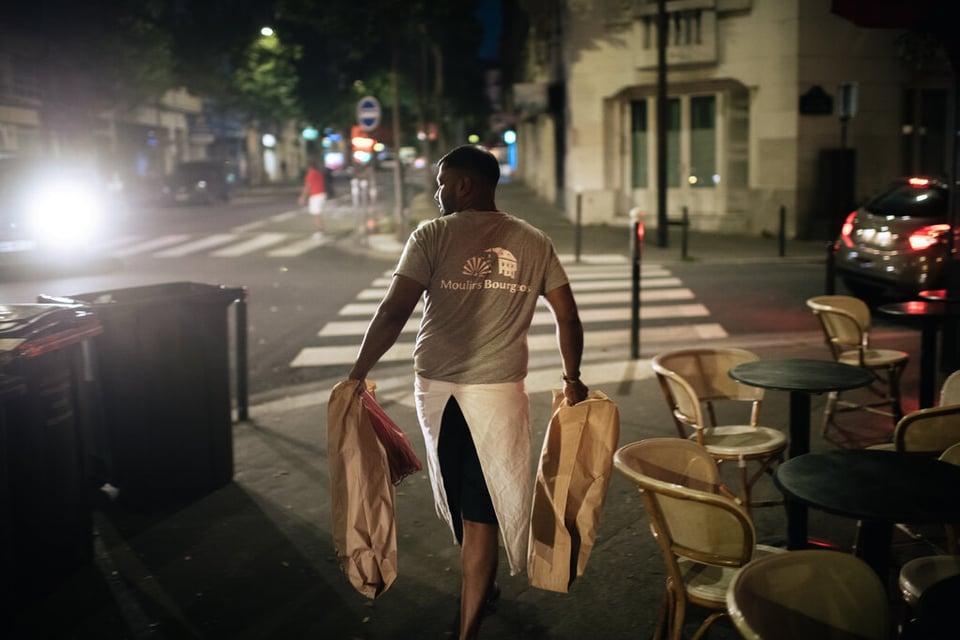
Mr. Selvarajah carrying paper bags with baguettes made for the Élysée Palace outside his bakery in Paris, in September.
The baker’s Sri Lankan wife, whom he married in France, has become a French citizen, and both his children are also French. Will he follow suit? “Maybe one day,” he said, “but right now I don’t have time.” His 10-year residence permit is enough.
Mr. Selvarajah is, however, not altogether happy over what the prize has meant for him so far. He has not been invited to meet Mr. Macron, who had a selfie taken with some previous winners. He feels he has gotten less French media attention than others in the past.
Nor was he invited to a party this month organized by the confederation of French bakers marking the anniversary of the creation of the “traditional baguette,” defined with great detail in the 1993 “Décret Pain,” or Bread Decree, a quintessentially French edict laying out the procedure and characteristics required to be deemed “traditional.”
The baker attributes these perceived sleights to the fact he is the first winner who is not from France or a country with a colonial connection to it. He also believes his decision not to become a French citizen is resented. “It’s not pleasant, but I don’t give a damn,” he said.
He thought for a moment. “I’m thinking about expanding the franchise in Dubai and Sri Lanka, promoting French baguettes made by a Sri Lankan. There are big possibilities.”
Asked if the Élysée had paid him for all the baguettes delivered, he said with a shrug: “Not yet. Maybe at the end of the month.” (New York Times).
Today, I was honored to return to the @StateDept and join @SecBlinken in unveiling my official portrait as 67th Secretary of State.
— Hillary Clinton (@HillaryClinton) September 26, 2023
We're delighted to share it with the American public right here, in case you don't make it in person to headquarters in Foggy Bottom anytime soon. pic.twitter.com/YcPymY77aq
________________________________
Hope all the New Yorker readers of The Roundup are safe and well, following yesterday’s torrential rains. If anyone needs help, please reach out. Remember, as Joyce Vance always says, we are in this together.